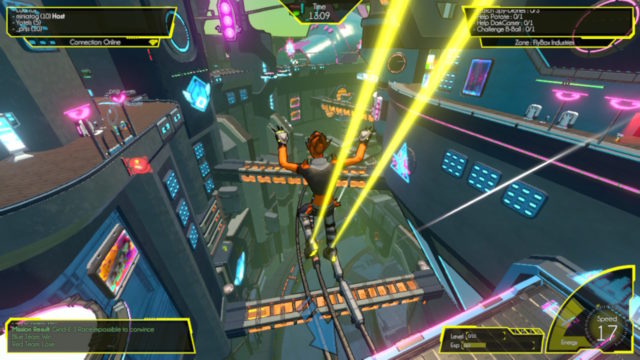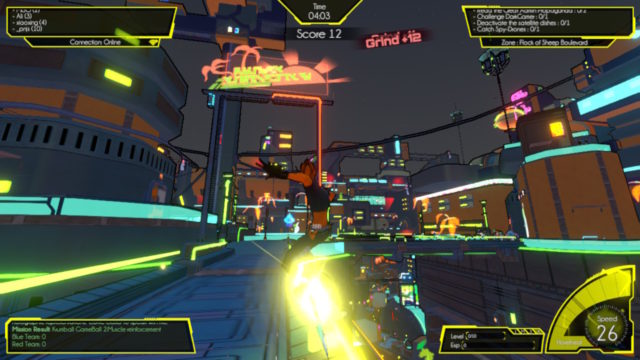Somewhat recaptures an underserved idea's appeal; colorful world; cool music; gameplay rewind feature.
Navigating menus is infuriating; fonts are hard to read; repetitive missions; gameplay is far too loose; uninteresting level design.
We live in an age of spiritual sequels and follow-ups. Many older genres and series either never caught on or fell out of favor over time, resulting in many gamers and developers longing to experience or recreate the sorts of games that defined their earlier years. Hover is the latest game to adhere to this trend, drawing obvious inspiration from the unique action rollerblading game Jet Set Radio, originally released by Sega for the Dreamcast. The game found a small niche that justified a sequel for Xbox a few years later, but that’s all that history had for the series. 16 years later, Hover from developer FustyGame stands as a spiritual continuation of the concept, however that might not be for the best.
Hover puts players in the boots of a rebel using the power of parkour to battle the oppressive forces of a regime bent on the eradication of fun in a futuristic, sci-fi city. While the story is filled with events and characters, it largely serves as a vehicle for justifying the gameplay, though a little more effort in creating interesting characters and compelling events would have been nice. It also would have helped to present the story in dialogue with more than just small, often hard to read text boxes.

Of course, a weak story in this sort of game usually isn’t enough to hamper quality gameplay execution, but that too is sadly lacking. Players run, jump, and grind through large, open environments as they tackle missions built around delivering items and/or racing other characters or just against the clock. There are also obstacles presented by the evil regime, but they are mostly just small distractions. Ultimately, the biggest problem comes down to the mechanics and repetition. Missions rarely evolve past the aforementioned concepts and the game isn’t all that satisfying to play thanks to a general sense of floatiness. Sometimes, chaining together jumps and grinds to build your speed up can be fun, but it mostly just feels random as you hunt for poorly defined routes through the environment. The one idea worth merit is a rewind feature that brings you back a few moments should you make a catastrophic mistake and plummet hundreds of feet down, well away from your desired objective. Unfortunately, one genuinely good idea and an occasional compelling moment aren’t worth all that much.
Looking at the game’s presentation, Hover takes a step forward before falling back again. While it features very simple geometry in its environments and characters, the game actually looks pretty good thanks to its colorful, almost comic-like aesthetic. While not truly impressive, it’s at least usually very pleasant to behold… assuming, of course, you aren’t moving. In the midst of the action, Hover tends to stutter quite a bit with brief, but frequent, instances of slowdown and dropped frames, something that speaks to poor optimization when you consider the brilliant technical wizardry pulled off on the Switch by many other developers. But all these issues pale in comparison when you consider the horrible interface. Menus are navigated via a mouse-like cursor controlled by the analog stick; an utterly baffling decision that slows the simple process of just making basic selections. Furthermore, the markers placed around missions showing characters and objectives are often incredibly difficult to spot in the world thanks to the busy color palette and a painfully small font that also impacts the legibility of menus.

At least the soundtrack is pretty good! While many indie developers are trying to sound as eighties as possible, admittedly often to very good effect, Hover is more interested in a vibe similar to its inspiration. While I’m far from an expert on the genre or time frame, the soundtrack seems to ring true to the late 90s, early 2000s sensibilities of the techno-pop found in the Jet Set Radio games. Even if it isn’t your favorite genre, it fits the feel and atmosphere of the game and helps it set itself apart.
Hover ultimately feels like a sincere effort by passionate developers to recapture the spirit of a long dead concept. Unfortunately, whether it was a matter of time, resources, or talent, they simply didn’t have access to the means to fulfill that desire. The game mostly looks the part, but the gameplay is just far too loose and repetitive to make it a compelling play for all but the most desperate of gamers looking to scratch the Jet Set itch. Then again, even some of those players might be turned off once they actually have to deal with the horrible menus. The fact that the music is pretty decent and the game isn’t unplayable might satisfy some out there, but I think most gamers are better served by simply skipping this one.
Nintendojo was provided a copy of this game for review by a third party, though that does not affect our recommendation. For every review, Nintendojo uses a standard criteria.




 ShareThis
ShareThis





